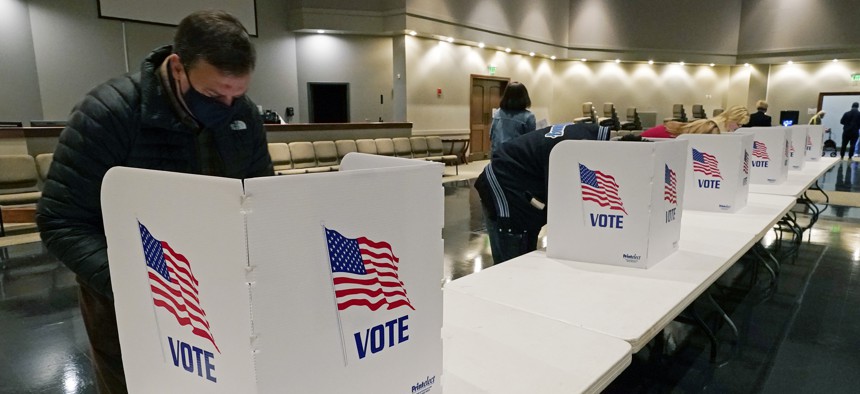House to Vote on Elections Bill That Would Set New Standards For States

Privacy voting booths are set up six-feet away from each other in the worship center of the Highland Colony Baptist Church in Ridgeland, Miss., on Election Day, Tuesday, Nov. 3, 2020. AP Photo/Rogelio V. Solis
Supporters say the legislation will protect voter access. Republican officials argue that it will encroach on states’ rights.
The House is set to consider sweeping election reform legislation this week that would overhaul the nation’s voting, campaign finance and ethics laws and impose new mandates on state and local elections officials.
The measure, dubbed H.R. 1, has the support of every Democrat in the House and the Biden administration.
But some state elections officials are pushing back against the bill, saying its provisions encroach on their authority and ability to decide what voting protocols work best for their communities. It’s unclear whether those concerns could doom the bill in the narrowly Democrat-controlled Senate.
States adopted new guidelines to expand access to absentee ballots and early voting during the coronavirus pandemic. While some states have sought to make the changes permanent, other conservative-leaning legislatures are pursuing proposals that would restrict those practices.
The federal bill is needed to protect voting rights as some legislatures look to adopt laws that would make it more difficult for people to vote, said Rep. Zoe Lofgren when she spoke at the National Association of Secretaries of State conference last month.
“We would be blind if we didn’t notice some legislatures that are not as committed to voter empowerment as election officials are moving to make it harder for people to vote. That really is not acceptable,” said Lofgren, a California Democrat. “There are some partisan efforts to suppress the vote through changing the laws and we really cannot allow Americans to be disadvantaged in that way.”
H.R. 1 is aimed at promoting voter access, strengthening campaign finance laws and reforming redistricting rules.
Voter access provisions in the bill would require states to offer same-day and online voter registration, as well as absentee ballot drop boxes. The legislation also calls for states to use voter-verified paper ballots, and to pay for postage on all absentee ballot related mailings, including ballot request forms and ballot return envelopes. The bill also requires that states offer early voting 10 hours a day for 15 consecutive days before a federal election, and it would allow voters to designate a person to return a sealed absentee ballot on their behalf.
“The bill is full of things like that that are going to raise the blood pressure of local election officials,” said Charles Stewart III, a political science professor at Massachusetts Institute of Technology, who studies elections and voting technology.
Currently 40 states offer online voter registration and 21 states allow same-day voter registration, according to the National Council of State Legislatures.
Neither the National Association of Secretaries of State, nor the National Association of State Election Directors has taken a position on H.R. 1. But some individual state elections officials are speaking out against the bill.
A coalition of 16 Republican secretaries of state wrote to federal lawmakers last month calling the bill “dangerous overreach by the federal government into the administration of elections” and urging them to reject the legislation.
“Each state legislature should have the freedom and flexibility to determine practices that best meet the needs of their respective states,” wrote the officials, who were led by Alabama Secretary of State John Merrill. “A one-size-fits-all approach mandated by Congress is not the solution to any of our problems.”
Ohio Secretary of State Frank LaRose, also a Republican, noted that the 2020 elections were considered widely successful and said it was the states—not the federal government—that implemented the rules used.
“Forcing uniform standards, procedures, and expectations into state election systems, some far different than others and not built for those requirements, is like forcing a square peg into a round hole,” LaRose said in a statement advocating for lawmakers to reject the bill. “It won’t work.”
But Democrats, like Maine’s Secretary of State Shenna Bellows, have spoken in support of the measure. Bellows told a House committee last week that Maine’s election policies already contain voting access provisions similar to those in H.R. 1.
“Our laws and policies, many of which are consistent with the provisions of H.R. 1, have encouraged broad participation in elections and public service by people from diverse backgrounds and walks of life,” Bellows said.
The Biden administration supports the bill and issued a statement Monday saying the legislation “is urgently needed to protect the right to vote and the integrity of our elections, and to repair and strengthen American democracy.”
Noting the size and scope of the legislation, however, the administration said it expects to work with Congress to “refine” certain provisions if the bill heads to the Senate.
Andrea Noble is a staff correspondent with Route Fifty.
NEXT STORY: As More Americans Struggle to Pay Water Bills, Affordability Solutions Are Past Due





